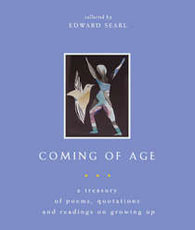When the Baby Boom generation was growing up and coming of age the popular culture was enthralled with the process. Youthful rebellion was in vogue, and millions of boys and girls left home for new adventures. Nowadays there are still movies about this time of life, but there is not much analysis of what is going on in the hearts and minds of those navigating this transition.
Edward Searl, a minister for 25 years, is the editor of a series of books from Skinner House where he takes a subject and then explores it through a mix of poems, quotations, and readings. Here he does a fine job mapping the art of coming of age, that period of passing from childhood to adulthood.
"Do you remember that moment in your early teens when the adults whom you grew up around really saw that glimmer in you of what was to come?" writes Hannah Wells. "Or when you first did something that impressed the adults, and it gave you the first taste of what it feels like to be acknowledged as a person, regardless of your age? This is a moment of coming of age, when you become aware of the extent of your own worth and dignity as a human being by way of the world simply noticing you. Coming of age. It's part of coming to our full humanity, of claiming our promise."
These poems, quotations, and readings convey the restlessness, the questing, the physical changes, the sexual explosions, and the yearning to find affirmation and love. Mason Cooley describes adolescence as a period when one "is both an impulsive child and a self-starting adult."
In his poem "The Way," Kenneth Patton catches perfectly the independence of those who seek to make their own way in the world. And Robert T. Weston's description mirrors the jealousy of older generations:
"Beautiful are the youth
whose rich emotions flash and burn,
whose lithe bodies filled with energy and grace
sway in their happy dance of life"
